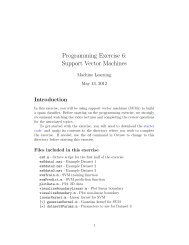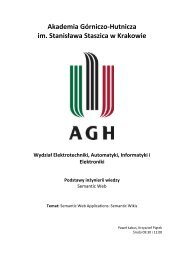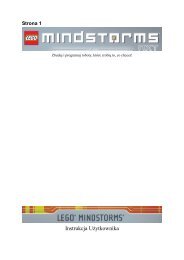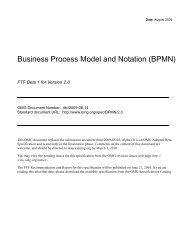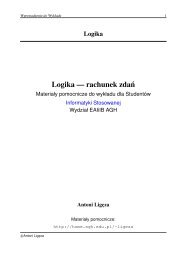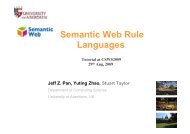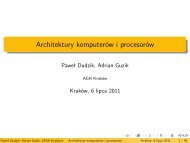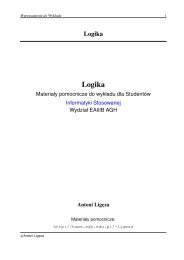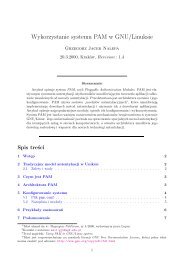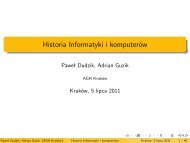An Evaluation of Knowledge Base Systems for Large OWL Datasets
An Evaluation of Knowledge Base Systems for Large OWL Datasets
An Evaluation of Knowledge Base Systems for Large OWL Datasets
Create successful ePaper yourself
Turn your PDF publications into a flip-book with our unique Google optimized e-Paper software.
P q = max (1 – N<br />
T q<br />
, <br />
T q is the response time (ms) <strong>for</strong> query q and N is the total number <strong>of</strong> triples in the<br />
dataset concerned. To allow <strong>for</strong> comparison <strong>of</strong> the metric values across datasets <strong>of</strong> different<br />
sizes, we use the response time per triple (i.e., N<br />
T q<br />
) in the calculation. Also we<br />
use a timeout value to eliminate undue affect <strong>of</strong> those query response time that is extremely<br />
far away from others in the test results: if to a certain query q, a system’ s response<br />
time per triple is greater than 1- where is a very small positive value, we<br />
ZLOOXVH IRU3 q instead. has the same role as in F q .<br />
Generally speaking, the CM metric will reward those systems that can answer queries<br />
faster, more completely and more soundly.<br />
2.5 Benchmarking Architecture<br />
Fig. 2 depicts the architecture <strong>of</strong> the benchmarking. LUBM prescribes an interface to<br />
be instantiated by each target system. Through the interface, the benchmark test module<br />
launches the loading process, requests operations on the repository (e.g. open and<br />
close), issues queries and obtains the results. Users in<strong>for</strong>m the test module <strong>of</strong> the target<br />
systems and test queries by defining them in the KBS configuration file and query definition<br />
file respectively. It needs to be noted that queries are translated from the above mentioned<br />
KIF-like language into the query language supported by the system prior to being issued<br />
to the system. In this way, we want to eliminate affect <strong>of</strong> query translation to the query<br />
response time. The translated queries are fed to the tester through the query definition file.<br />
The tester just reads the lines <strong>of</strong> each query from the definition file and passes them to the<br />
system.<br />
LUBM<br />
Test Module<br />
Data Generator<br />
KBS<br />
Configuration<br />
Query<br />
Definition<br />
Benchmark Interface<br />
Benchmark Interface<br />
Benchmark Data<br />
KBS 1<br />
KBS n



